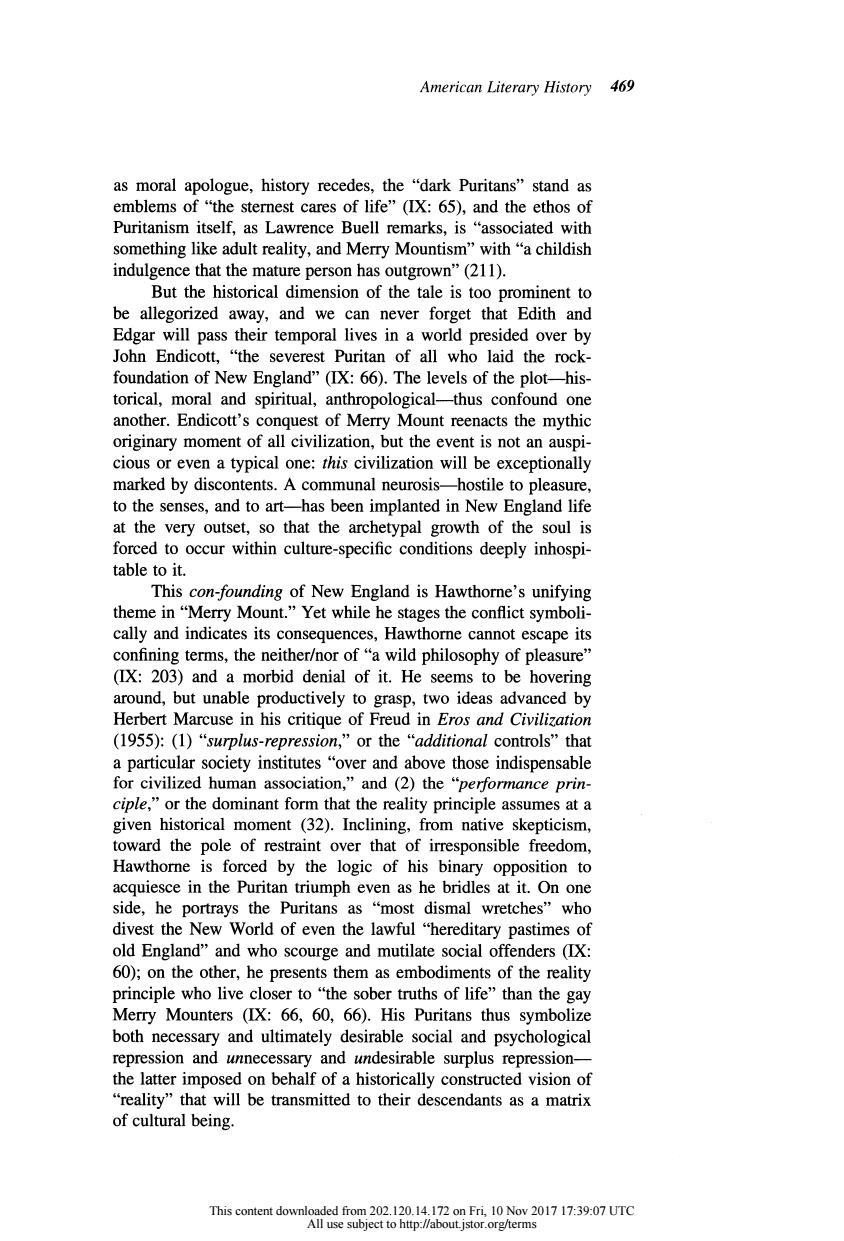正在加载图片...

American Literary History 469 as moral apologue,history recedes,the "dark Puritans"stand as emblems of "the sternest cares of life"(IX:65),and the ethos of Puritanism itself,as Lawrence Buell remarks,is "associated with something like adult reality,and Merry Mountism"with"a childish indulgence that the mature person has outgrown"(211). But the historical dimension of the tale is too prominent to be allegorized away,and we can never forget that Edith and Edgar will pass their temporal lives in a world presided over by John Endicott,"the severest Puritan of all who laid the rock- foundation of New England"(IX:66).The levels of the plot-his- torical,moral and spiritual,anthropological-thus confound one another.Endicott's conquest of Merry Mount reenacts the mythic originary moment of all civilization,but the event is not an auspi- cious or even a typical one:this civilization will be exceptionally marked by discontents.A communal neurosis-hostile to pleasure, to the senses,and to art-has been implanted in New England life at the very outset,so that the archetypal growth of the soul is forced to occur within culture-specific conditions deeply inhospi- table to it. This con-founding of New England is Hawthorne's unifying theme in "Merry Mount."Yet while he stages the conflict symboli- cally and indicates its consequences,Hawthorne cannot escape its confining terms,the neither/nor of"a wild philosophy of pleasure" (IX:203)and a morbid denial of it.He seems to be hovering around,but unable productively to grasp,two ideas advanced by Herbert Marcuse in his critique of Freud in Eros and Civilization (1955):(l)“surplus-repression,”or the“additional controls'”that a particular society institutes "over and above those indispensable for civilized human association,"and (2)the "performance prin- ciple,"or the dominant form that the reality principle assumes at a given historical moment (32).Inclining,from native skepticism, toward the pole of restraint over that of irresponsible freedom, Hawthorne is forced by the logic of his binary opposition to acquiesce in the Puritan triumph even as he bridles at it.On one side,he portrays the Puritans as "most dismal wretches"who divest the New World of even the lawful "hereditary pastimes of old England"and who scourge and mutilate social offenders (IX: 60);on the other,he presents them as embodiments of the reality principle who live closer to "the sober truths of life"than the gay Merry Mounters (IX:66,60,66).His Puritans thus symbolize both necessary and ultimately desirable social and psychological repression and unnecessary and undesirable surplus repression- the latter imposed on behalf of a historically constructed vision of "reality"that will be transmitted to their descendants as a matrix of cultural being. This content downloaded from 202.120.14.172 on Fri,10 Nov 2017 17:39:07 UTC All use subject to http://about.jstor.org/termsAmerican Literary History 469 as moral apologue, history recedes, the "dark Puritans" stand as emblems of "the sternest cares of life" (IX: 65), and the ethos of Puritanism itself, as Lawrence Buell remarks, is "associated with something like adult reality, and Merry Mountism" with "a childish indulgence that the mature person has outgrown" (211). But the historical dimension of the tale is too prominent to be allegorized away, and we can never forget that Edith and Edgar will pass their temporal lives in a world presided over by John Endicott, "the severest Puritan of all who laid the rock foundation of New England" (IX: 66). The levels of the plot?his torical, moral and spiritual, anthropological?thus confound one another. Endicott's conquest of Merry Mount reenacts the mythic originary moment of all civilization, but the event is not an auspi cious or even a typical one: this civilization will be exceptionally marked by discontents. A communal neurosis?hostile to pleasure, to the senses, and to art?has been implanted in New England life at the very outset, so that the archetypal growth of the soul is forced to occur within culture-specific conditions deeply inhospi table to it. This con-founding of New England is Hawthorne's unifying theme in "Merry Mount." Yet while he stages the conflict symboli cally and indicates its consequences, Hawthorne cannot escape its confining terms, the neither/nor of "a wild philosophy of pleasure" (IX: 203) and a morbid denial of it. He seems to be hovering around, but unable productively to grasp, two ideas advanced by Herbert Marcuse in his critique of Freud in Eros and Civilization (1955): (1) "surplus-repression" or the "additional controls" that a particular society institutes "over and above those indispensable for civilized human association," and (2) the "performance prin ciple" or the dominant form that the reality principle assumes at a given historical moment (32). Inclining, from native skepticism, toward the pole of restraint over that of irresponsible freedom, Hawthorne is forced by the logic of his binary opposition to acquiesce in the Puritan triumph even as he bridles at it. On one side, he portrays the Puritans as "most dismal wretches" who divest the New World of even the lawful "hereditary pastimes of old England" and who scourge and mutilate social offenders (IX: 60); on the other, he presents them as embodiments of the reality principle who live closer to "the sober truths of life" than the gay Merry Mounters (IX: 66, 60, 66). His Puritans thus symbolize both necessary and ultimately desirable social and psychological repression and wraiecessary and undesirable surplus repression? the latter imposed on behalf of a historically constructed vision of "reality" that will be transmitted to their descendants as a matrix of cultural being. This content downloaded from 202.120.14.172 on Fri, 10 Nov 2017 17:39:07 UTC All use subject to http://about.jstor.org/terms